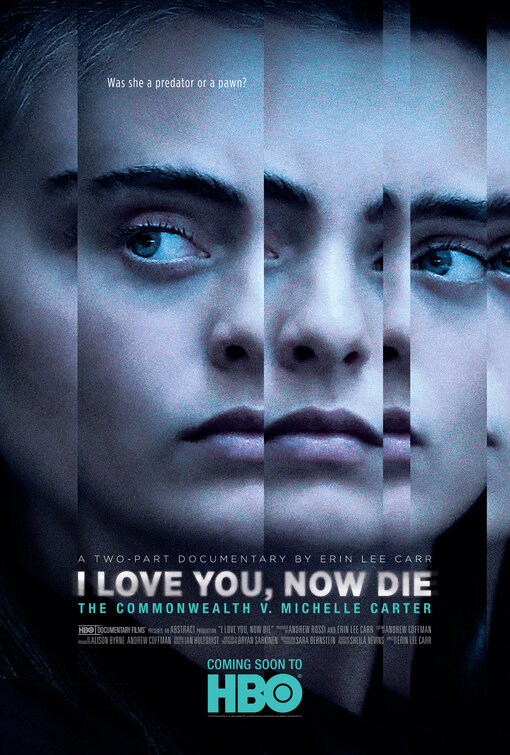
Were Roy’s anxiety, depression and multiple suicide attempts a result of his parents’ acrimonious divorce and sometimes violent aggression toward him? Did Carter encourage Roy’s suicide because she was a needy self-harmer struggling with mental health issues, a sociopath seeking attention as a grieving girlfriend, a daydreamer living in a romantic Glee-fueled fantasy world or a misguided friend trying to ease his suffering? Truthfully, the pair were more pixel than flesh to each other, having lived only an hour away by car but never meeting in person more than a handful of times in the two years of their relationship. These silent moments reading their staccato, teen-speak sentences lull you into an elegiac rhythm, their words bobbling along like a shared poem. Much of the doc is peppered with images of bucolic New England lighthouses and rippling oceanic waters set against Roy and Carter’s pinging texts to each other. Ultimately, however, the narrative is more akin to a seaside Lynchian fever dream, your brain conjuring up actors like Miles Teller and Cara Delevingne whispering horrible nothings at each other into the thin air of night. Part detective story, part cautionary tale and part courtroom drama, the documentary weaves you through multiple (and often confounding) angles, from Roy’s unreliable narrator parents to Carter’s Teflon defense team to a quack doctor who may or may not have a sound argument in the end. After all, soliciting a murder is a crime… but it’s an underlying crime regardless.

'Big Little Lies' Finale to 'Bohemian Rhapsody': What's Coming to HBO in July
#I love you now die free#
Could mere words alone Wormtongue a person toward his or her own death? Can prosecutors and defense attorneys prove the nature of free will? What is the cognitive neuroscience behind two psychologically impaired adolescents manipulating each other with the tools of technological dystopia? Like the popular teen drama 13 Reasons Why, which also unpacks the tragedy of suicide, I Love You, Now Die is an inverse whodunit: a metaphysical mystery where you already know whodunit, but not exactly why or who else may be objectively liable.

(Warning: Best not bring up the case during an otherwise pleasant vacation dinner with friends.)

And as Carr demonstrates via recorded interviews with incredulous Massachusetts locals, the Commonwealth v. (Night one is devoted to Roy’s alleged point-of-view night two explores Carter’s.) No matter how your judgment vacillates, the more you learn, the more you just realize how deeply weird this story is. It’s the stuff of a Jodi Picoult novel.ĭirector Erin Lee Carr ( Mommy Dead and Dearest) deftly layers her story with arguments, reveals and twists that will continuously unearth and rebury your opinion on Carter’s culpability, even long after the doc’s final moments. But the question of whether the 17-year-old girl was ultimately responsible for her boyfriend’s death is the crux of HBO’s captivating two-part documentary I Love You, Now Die, which relies on journalistic expertise, contradictory witness testimony, absorbing courtroom video recordings and the shocking text exchanges themselves to parse the sticky legal push-and-pull of the case. Overall, it's an excellent documentary that asks viewers to think about what happened from multiple points of view while considering the legal and moral value systems in which we operate.In 2017, the state convicted Michelle Carter of involuntary manslaughter for her brutal haranguing (which she’s now appealing to the Supreme Court under claims of free speech). It also looks at the media's role in creating an oversimplified and subjective public story about the case, which exploits cultural and sexist stereotypes. Instead, it successfully broadens the narrative about the case by placing it within a larger social context, and raises questions about the the way family dynamics, popular culture, and all-to-willingly prescribed antidepressants played a role in the events leading up to and following Conrad Roy's death. The role mental illness played in both teens' lives, and how this uniquely impacted the teens' relationship, is also a major part of the conversation.īut I Love You, Now Die doesn't provide any answers.

It points to some of the legal ramifications of expanding current homicide and coerced suicide laws to consider communications via text and other digital media as potential evidence of punishable coercion. This thoughtful documentary offers an intelligent and unbiased look at the disturbing details surrounding the case against Michelle Carter.


 0 kommentar(er)
0 kommentar(er)
